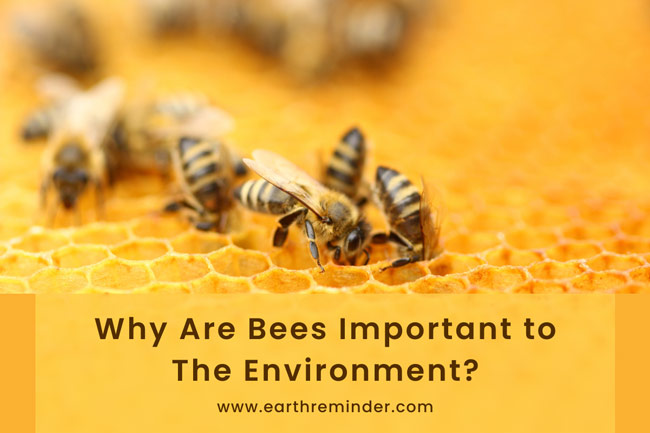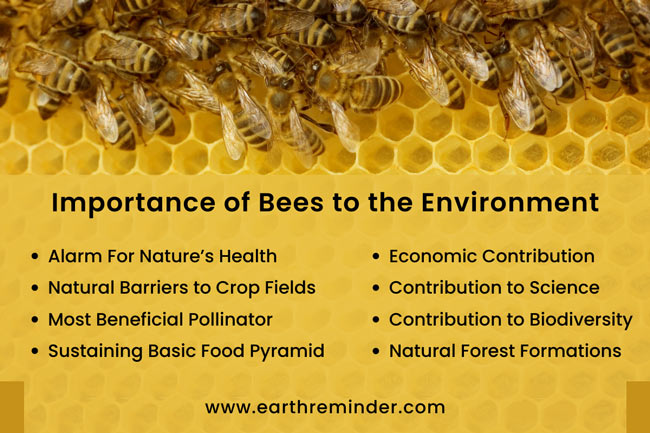Why Are Bees Important to The Environment?
Understanding the importance of bees for the development of a proper sustainable environment.
Table of Contents
- 1 Introduction to Bees
- 2 Importance of Bees to the Environment
- 2.1 Economic Contribution to the Environment
- 2.2 The Most Beneficial Pollinator
- 2.3 Contribution By the Bees to Biodiversity
- 2.4 Sustaining the Basic Food Pyramid
- 2.5 Natural Forest Formations
- 2.6 Natural Barriers to Crop Fields
- 2.7 Contribution of Bees to Modern Science
- 2.8 Alarm For Mother Nature’s Health
- 3 Some Factors Affecting the Bee Population
- 4 Wrapping Up
Introduction to Bees
Throughout history, bees have played a vital role in conserving the environment. The recorded history of bees being used in human society dates back as far as 9000 years.
As the evolution of bees dates back hundreds of thousands of years, they are tightly knitted into environmental development.
Bees, as we all know, are the most important pollinators known to humans. This single insect is responsible for honey, beeswax (a renewable fuel source), pollination, growth, and development of crops, and various other essential aspects of nature. There are lots of species of bees and honey bees found all over the world, and even many undiscovered species exist today.
So, why are bees so important to the environment? We will be talking about their contribution below, and yes, honey bees are the all-rounder and the most relevant bee species.
Importance of Bees to the Environment
The question pops into mind: How big a hand do bees have in supporting our beautiful environment? How do these diminutive insects help to maintain balance in the background? Below given facts about bees will blow your mind.
Economic Contribution to the Environment
An entire industry of beekeeping and harvesting revolves around the bees, commonly referred to as “apiculture”. Some families have been traditionally engaged in this sector. Beehive harvesting by bee farmers results in products such as honey, bee pollen, beeswax, bee venom, royal jelly, and much more.
- Honey: Honey, as everyone knows, is one of the essential food products available on the market. Often designated as a “super-food”, honey is also known to cure specific ailments.
- Beeswax: Beeswax is used as a renewable form of fuel. It is also used to make waterproof clay items and has vast application in the industrial sector.
- Bee pollen: Bee pollen differs from normal pollen obtained from a flower. Bee pollen is used as a “super food” and also for various consumable purposes in the fitness and medical industry.
- Royal jelly: Royal jelly has found its usage from early civilization. today, it is used as a treatment for specific ailments like influenza, etc., in the medical industry.
- Bee venom: Bee venom is the toxin that is found in honeybees. It is also used in the medical industry to treat ailments such as arthritis and more.
The Most Beneficial Pollinator
The truth is, bees are not the only pollinators around. There are a lot of other pollinators. Then, why are bees announced as the best pollinators? The reason is that bees are known to pollinate almost every plant capable of being pollinated. No other insects come close to the wide range of pollinations performed by the bees.
Moreover, bees are known to produce byproducts beneficial to human beings. The entire hive can be harvested and used for human consumption. Humans can use no other insects in the manner they use bees.
Contribution By the Bees to Biodiversity
Research has repeatedly proven that biodiversity is essential for a sustainable environment. The biodiversity of a region is also majorly impacted by the presence of a thriving bee population. Since bees are directly involved in the active pollination of a wide array of flora, they improve the gene pool of the plant species in a particular location by cross-pollination.
Bees harvest nectar in a unique way that helps confirm successful pollination. Some plants require a highly sophisticated approach to pollination, such as a short window of time, unique flower structure, etc., and here, bees are the most successful and appropriate in pollinating these specialized plants. This itself explains why are bees so important to the environment.
Sustaining the Basic Food Pyramid
We already know that a thriving bee population results in broader biodiversity. It means more microhabitats for different animals, birds, and insects. Birds are a general predator of bees, and thus the bird population is significantly impacted by their presence.
Bees have evolved through a very long and selective process of natural selection. They inhabit the base level of the food chain while being one to contribute the most to the development of this base.
The presence of different species of bees all around the world proves their importance in the ecosystem. Scientists have also discovered certain flowers which only accept bees as pollinators with their unique structure and adaptations.
Natural Forest Formations
Recently, substantial forest fires were reported in Amazon, Africa, Australia, and almost all over the world, burning for days, months, and even longer. it is not the first time; it will die down and happen again.
Nature needs time to heal. Bees being the pollinators are not only restricted to pollinating field crops; they pollinate almost all types of trees, shrubs, and other plants.
Regrowth is of prime importance, and bees help the environment in that way. Regrowing a burned patch of land by pollination is way more straightforward compared to human efforts that can only be limited.
Since bees remain at the base level of the food chain, they will encourage more fauna activity alongside decimated barren lands, increasing the fertility of the land. in short, replenishing the lost greens in a very effective manner.
Natural Barriers to Crop Fields
Farmers around the world living in close proximity to forest land have been implementing bees as a natural deterrent to wild animals. The presence of beehives along the edges of fields discourages animals such as elephants and other herbivores from wandering inside and destroying field crops. Also, field crops that require pollination are positively affected by this type of implementation.
It is estimated that bees visit 90% of the top 107 crops in the world. Farmers who are involved in producing plants other than regular food crops can take advantage of the pollinating power of bees.
Contribution of Bees to Modern Science
Several scientific advancements in architecture and human behavioral science have been contributed to studies made on bees. There are even military applications of bees found in a recent study by scientists.
The application of hexagonal patterns in architectural design has been implemented by humans for ages, and there is a very high chance that the plans have been “copied” from the very structure of the cells in a beehive. Recent scientific studies suggest that there is a direct connection between architecture and beehive design that has been found in ancient buildings discovered in Ireland by archaeologists dating back to 2000 BCE.
Alarm For Mother Nature’s Health
A dwindling bee population is a tell-tale sign of the worsening conditions of a region. Most often, the bee population is decimated by human activities rather than natural activities. Instances such as forest fires, natural disasters, and environmental poisoning can result in long-term problems. This can be diagnosed effectively by studying the resident bee population. Scientists and researchers have been applying this method for ages to quickly find a problem in a landscape.
Some Factors Affecting the Bee Population
Pollution, deforestation, and global warming are three of the top concerning factors that are directly affecting bee populations worldwide. While there are ongoing efforts to conserve bee populations, it is still falling short. It is impossible for humans to conserve every species of bees, given the limited time and extent of damage that has already been done to the environment. With time, and proper measures, such as active participation in land and forest reformations and incorporating more greenery into our environment, there is a good chance that we can control the damage to a certain extent.
Wrapping Up
So, if you still ask, how are bees important to the environment? then you should understand that the points mentioned above are just the tip of the iceberg. Bees comprise the most critical sector in our food chain. It is directly linked to the growth of plants which supply us with food and oxygen to breathe and keeps the air clean.
It is our turn to protect the bees now. Their declining population suggests a looming global catastrophe. It’s never too late for anything. With proper measures to improve the greenery around us and active apiculture, we might find a solution to the problem.
We hope this article has helped you understand why bees are so important to the environment. If you like it, please share it with your friends and family members. Also, comment below for any queries.


